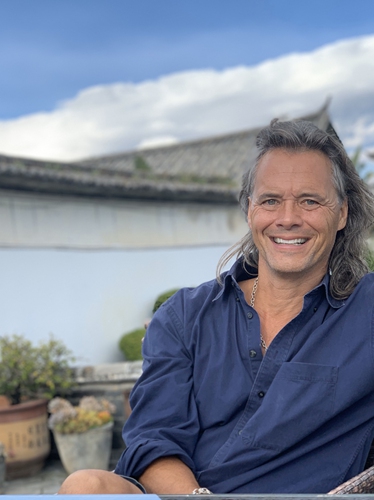Editor’s Note:
Having settled down in Xizhou township, Dali in Southwest China’s Yunnan Province for 15 years, Brian Linden from the US has poured his soul into operating a unique hotel that was renovated from four Chinese cultural heritage sites. The COVID-19 epidemic caused the closure of his boutique hotel, Xilinyuan, in January. The once hustling and bustling hotel and local community has fallen quiet, but for Linden, he believes that his second hometown can win the battle against the virus and restore its former vitality.
By Brian Linden
The old square is empty, shops are boarded up and a red banner blows from the upper reaches of a cell phone tower and inspires our town to pull together to fight off the novel coronavirus.
A few local residents sit on wooden benches, all but their eyes covered in cloth. I do not recognize some of them and cannot discern if they are smiling or frowning under their veils. I tell myself that this cannot be my adopted home.
Our village is usually alive with the commotion of merchants, farmers, and visitors. And yet today all is quiet in Xizhou.
Tough times
The virus struck during the passing of the Year of the Pig to the aegis of the Rat. According to traditional beliefs, the rat tires easily and often falls prey to illness. Some of our neighbors, sensing the health uncertainties associated with the rodent, purchased Buddhist and Taoist images to protect themselves and their families. Those deities now sit on their ancestral shrines, providing some solace to their hosts, but appear to have had little impact on our current predicament.
Chinese New Year is the calendar’s most raucous season. In rural China, whose aural environment is more commonly defined by the occasional barking dog or crowing rooster, the resonant discordance of firecrackers, joyous family reunions and mischievous children together take on the semblance of comfort. It is a time of celebration and hope.
This year is different. Signs are posted everywhere encouraging us to wash our hands and to stay away from crowded spaces. Loud speakers, operating from early in the morning to late at night, emphatically remind us to wear our masks and leave our homes only for necessities. Our markets cannot be entered without first scanning a QR code to show who we are, how many times we have left home and what we are buying. Entering the market, the vendors, most of whom have been my friends for a decade, now are indistinguishable and hauntingly quiet.
Xizhou’s streets are regularly sprayed down with an ammonia mixture that drowns out any remnants of the famous indigenous bread stands that closed in late January. Dogs and cats roam the cobbled stone alleys and birds boldly augur the elegant rooflines of the historic compounds that now seem to evoke little optimism.
I feel safe here, however. Even while we all struggle to respond to the impact of COVID-19, I believe that everyone is trying their best to ensure that the virus is contained and the sick are taken care of. I admire the thousands of doctors who have given up their family time and put themselves in harm’s way to help those who are suffering. I only wish that we could do more.
Walking up from a dream
These past few weeks have unfolded in a surreal manner. Our hotels were filled with festive guests, but gradually reservations were canceled, visitors cut their stays short and transportation links were curbed. Elbow rubs and foot bumps sent off our last guests, not the typical hugs and embraces that usually punctuated friends’ departures. Walking through the empty streets of our village makes last month’s zeal seem like a dream.
Even in the pandemic’s solitude, there are spirits that still walk our old village; souls that have seen the capriciousness of centuries of turbulent change. Their whispers echo through the winding cobbled stone pathways, imparting stories to those passing by and willing to listen. Upon these crumbling walls of mud and stone unfurl centuries of memories, from the stains of industry and monsoonal summers to the jottings and gouges of human interaction. Before COVID-19, I had little time to stop and discern the subtle messages that were carried on the buildings of our village and etched into the bronzed faces of our neighbors. Those stories now resonate much more clearly, amplified by the stillness imposed by the virus.
It is amongst these edifices and spirits that our story of hope unfurls. Strife has returned to our village behind the cloak of the virulent COVID-19. It seems natural that stories should now be shared to return us to some semblance of calmness and normality. Thirty-seven years ago I could not identify China on a world map; now my identity cannot be separated from this country. I foresee my spirit forever meandering through the lanes of Xizhou. This is my home now and I am here with China.
Happy May Day, China. After a challenging beginning to 2020, we are increasingly optimistic that the remainder of the year will experience a renaissance of travel. We encourage everyone to explore the diverse landscape and culture of this country. Travel should be not solely synonymous with leisure. We should be responsible sojourners, searching out opportunities for learning from others and impacting our destinations in a positive way. China’s history and culture, which are not always easily accessible in the increasingly homogenous urban environment, present endless attractions to any visitor. While the world is filled with allure, there is only one China.
Brian Linden Photo: Courtesy of Brian Linden



